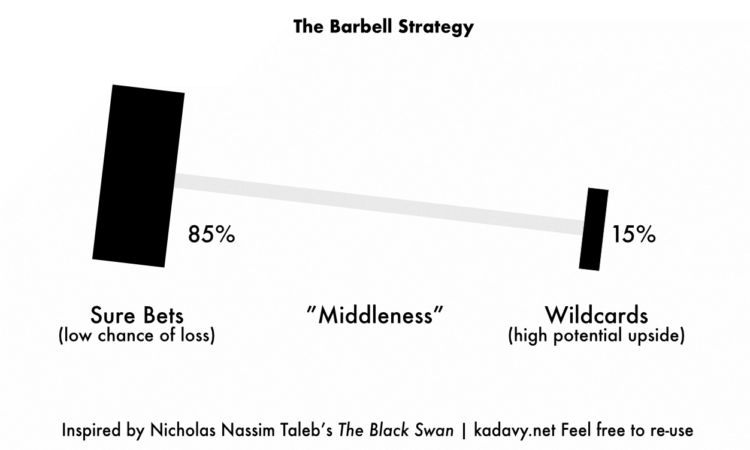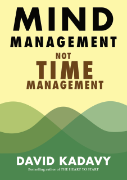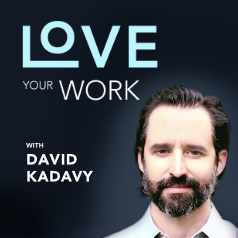Subscribe to blog updates via email »
What I Learned from Naval Ravikant’s Meditation Challenge – Love Your Work, Episode 246
UPDATE, February 28, 2025: I’ve now completed this challenge four times. It’s a little different every time, but I’m really warming up the idea of making an hour of meditation a part of my daily routine. Highly recommended!
I recently saw a tweet storm by entrepreneur/investor/philosopher Naval Ravikant. He was challenging people to meditate sixty minutes a day for sixty consecutive days.
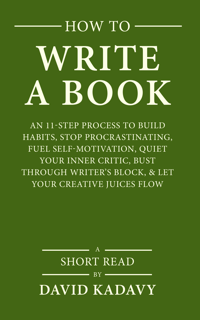
WANT TO WRITE A BOOK?
Download your FREE copy of How to Write a Book »
(for a limited time)
Naval Ravikant on meditation
Here’s a Naval on meditation, from The Naval Almanack:
Meditation isn’t hard. All you have to do is sit there and do nothing. Just sit down. Close your eyes and say, “I’m just going to give myself a break for an hour. This is my hour off from life. This is the hour I’m not going to do anything.
If thoughts come, thoughts come. I’m not going to fight them. I’m not going to embrace them. I’m not going to think harder about them. I’m not going to reject them. I’m just going to sit here for an hour with my eyes closed, and I’m going to do nothing.”
An hour a day of doing nothing? I thought, “That’s crazy!”
So, I did it. It changed the way I think about productivity.
Listen to What I Learned from Naval Ravikant’s Meditation Challenge
- Listen in iTunes >>
- Download as an MP3 by right-clicking here and choosing “save as.”
- RSS feed for Love Your Work

The view from the location of my 60th hour-long meditation session.
Who can give up an hour a day?
Giving up an hour a day for two months seemed impossible. But I knew if I didn’t at least try it, I’d be a hypocrite. I had just finished writing a book called Mind Management, Not Time Management, after all.
Taking on this challenge meant I’d be giving up an hour a day in the midst of launching a new book – which is always a busy time. But it also looked like the best possible test of my belief that time management is dead. I’d give up an hour a day of “doing” to just sit. I’d place less emphasis on time, and more emphasis on my mind.
Here’s how it went.
Meditation killed my motivation (in a good way)
The first couple weeks were the strangest. My mind was blank. I felt numb.
I lost all motivation. But probably not in the way you think. Usually, when people say they’ve lost motivation, they feel bad about it. They feel they should be motivated, but they are not.
Instead, I lost motivation in a good way. I didn’t feel bad about my loss of motivation. I didn’t think, “Oh no, I want to do things but can’t find the motivation!”
But I sensed my brain needed to discover new routes to motivation. What would that be like? I wanted to find out. So I kept going.
Do it, Delegate it, Defer it. How about Forget it!?
My lack of motivation didn’t manifest itself as a lack of motivation to do things I otherwise wanted to get done. Instead, when I thought of something I might do, I’d say to myself, “Nah! That’s not important!”
I’ve long been a practitioner of Getting Things Done (which I summarized on episode 242). One of the keys to making GTD work is to write down everything you think of doing – big, small, unimportant, important – even things you might do, “Someday/Maybe.”
After you write something down, you either do it, delegate it, or defer it. Thanks to meditation, I discovered a fourth option: forget it. In other words, don’t even write it down. Just let the thought pass.
This is easier said than done. GTD works because it closes “open loops” in your mind. If you don’t write the thing down – GTD wisdom states – you’ll keep thinking about it.
By meditating an hour a day, suddenly I was able to think of something I might do, decide it was unimportant, then forget about it completely!
But as I decided not to do the things I would otherwise do, the things I wasn’t going to do started bubbling to the surface.
Meditation sharpened focus on the things I did do
Setting aside an hour a day where I couldn’t do anything but let thoughts flow had two effects.
- It reduced the time I had to “do” the things I intended to do.
- It increased the time I had to think about things I would do, “if only I had the time.”
These effects had a symbiotic relationship: I didn’t have as much time to “do” things I intended to do, so I had to be more efficient with things I did do.
Doing begets more doing. Each time you do something, it reminds you of other things you could be doing. The more you do, the more entropy sets in and you make bad decisions.
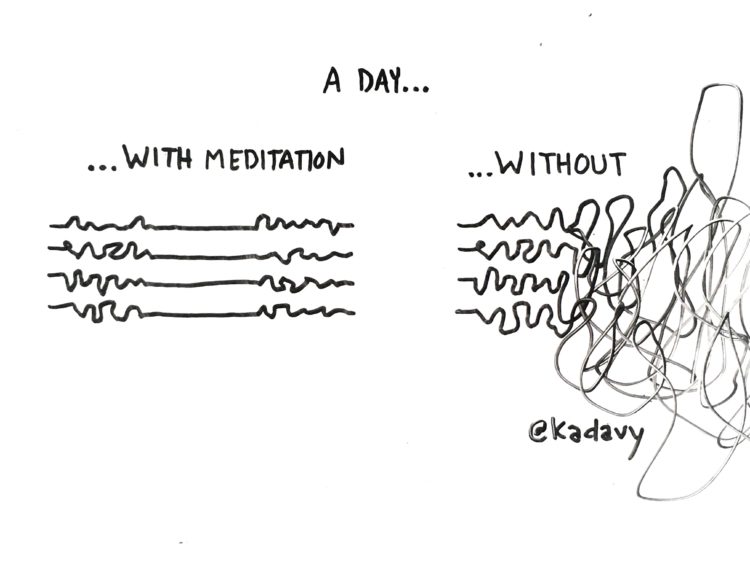
By meditating an hour a day, I had less time to do things, and more time to think about how I would do those things once I did them. So the things I did, I did better.
It is more productive to delete from the to-do list than to mark done.
Meditation made room for “wildcards”
Setting aside an hour a day also gave me more time to think about things I would do, “if only I had the time” – those crazy ideas you normally let pass through your mind. You say to yourself, “I wish,” “wouldn’t that be nice,” or “that would never work, anyway.”
By thinking more about the crazy ideas I wasn’t likely to follow, those ideas started to take on more importance in my mind. As I thought more about these ideas, they started to seem doable. Things like taking a solo retreat to a cabin in the Colombian countryside.
I still wasn’t sure my crazy ideas were going to work, but I came to a realization about that, too.
We’re bad at using our conscious attention anyway
I realized we’re bad at consciously using our attention. Scientists have known this for a long time. Daniel Kahneman and Amos Tversky coined it “the planning fallacy.”
You see the planning fallacy in action when you try to log into your bank account to pay a bill. You think it’s going to take two minutes. But then your password manager malfunctions. Then you have to complete three pages of CAPTCHAs. Then you have to do two-factor authentication, so you grab your phone. But your phone has a text message on it. You know the drill.
The planning fallacy compounds as complexity creep takes over (which I talked about on episode 237). This is why fewer than half of students complete their papers in less time than their worst-case projection. This is why the Sydney Opera House took ten years longer and fifteen times the budget to build as expected.
So if we’re bad at using our conscious attention anyway, maybe we shouldn’t put much trust in ourselves to use all our conscious attention getting things done?
We don’t know what will work
We spend all our waking attention trying to do things. We think, If only we could do all the things we intend to do, we would finally achieve the success we deserve.
The things we intend to do don’t just take more time than expected. Nassim Taleb demonstrates in The Black Swan (which I summarized on episode 244) we also have no idea whether things we’ve decided to do are worth doing in the first place.
In the “Extremistan” world of creative work, our biggest successes often come from trying to do one thing, then stumbling upon another. Europeans discovered the New World while searching for a route to India. The microwave was discovered when a radar experiment accidentally melted a chocolate bar. Penicillin was discovered when experimental samples got contaminated. I got my first book deal while trying to land a slot to speak at a conference.
As William Goldman said, “Nobody knows anything.” Goldman’s not knowing anything didn’t keep him from winning two Academy Awards for screenwriting.
Meditation is the “Barbell Strategy” for attention
If great discoveries come at random, what can you do? You have to be doing things that might not work, and you have to be ready when a great idea comes. As Louis Pasteur said, “Chance favors the prepared mind.”
To give yourself a chance at making great discoveries, Nassim Taleb recommends “the Barbell Strategy.” Invest 85% of your resources on sure bets. Invest the remaining 15% of your resources on wildcards – those crazy ideas that probably won’t lead to anything, but that have unlimited upside. (You can learn more about the Barbell Strategy in my The Black Swan book summary on episode 244).
Meditating 60 hours in 60 days had more benefits than I could list. I slept better, I had more intense dreams, I became more patient. But here’s the biggest thing I learned about productivity meditating 60 hours in 60 days: Meditation is the Barbell Strategy for your waking attention.
If we’re no good at using our conscious attention anyway, and if our best discoveries come at random, it makes perfect sense to surrender a portion of your conscious attention to randomness. If you invest one hour of your working day in meditation, you invest 12.5% of your working day in mental serendipity. That’s enough time not only to think about the crazy ideas you otherwise wouldn’t pursue, but also to think about the great discoveries happening right under your nose.
What about results?
When you’re working in “Extremistan,” you have to be weary of “results.” Big wins are rare, and positive Black Swans take time to grow. In the more than 500 blog posts I’ve written in the past 16 years, I’ve had two that led to Black Swans (one, a book deal, the other, working with a company that sold to Google).
But, I did have one big win during my meditation experiment. On the day I launched my new book, I had a winning tweet storm. The first tweet in the storm, alone, has over 100,000 organic impressions. I had over 150,000 impressions in one day. Previously, on a really good day, I might get 25,000 impressions.
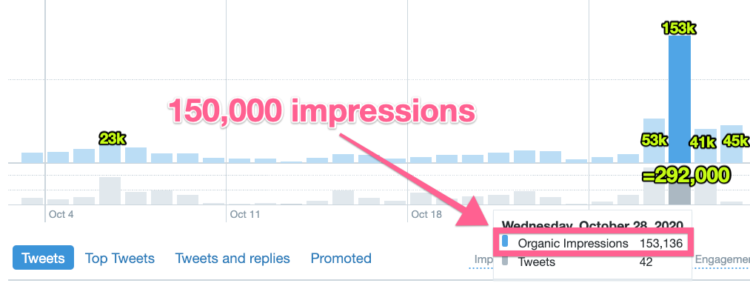
The end of that tweet storm brought 500 organic clicks to my book’s Amazon page.
This tweet storm took me several hours – over the course of weeks – to write, edit, and publish. Would I ever in a million years have bothered spending that much time on a tweet storm? No way, that’s a crazy idea. But thanks to my hour a day of meditation, I couldn’t let the idea go.
And now?
Meditating 60 hours in 60 days changed the way I think about productivity. So what did I do once I was done? I meditated the next day, and the next day, and the day after that. At this point, I’ve meditated an hour a day for more than 80 days in a row.
It’s a crazy idea, but this is just something I do now.
Listen to the Podcast
- Listen in iTunes >>
- Download as an MP3 by right-clicking here and choosing “save as.”
- RSS feed for Love Your Work
Mind Management, Not Time Management now available!
After nearly a decade of work, Mind Management, Not Time Management is now available! This book will show you how to manage your mental energy to be productive when creativity matters. Buy it now!
My Weekly Newsletter: Love Mondays
Start off each week with a dose of inspiration to help you make it as a creative. Sign up at: kadavy.net/mondays
Thank you for having me on your podcasts!
I’ve been on quite a few lately. Check me out on The Reader’s Journey from Alex and Books, on Debbie Jenkins’s Chaos to Creation Confessions, on Ravi Raman’s The Motivated Life, and on Conor Butts’s Personal Productivity.
If you’d like to have me on your podcast, please email me at david at kadavy dot net!
Join the Patreon for (new) bonus content!
I've been adding lots of new content to Patreon. Join the Patreon »
Subscribe to Love Your Work
Theme music: Dorena “At Sea”, from the album About Everything And More. By Arrangement with Deep Elm Records. Listen on Spotify »

